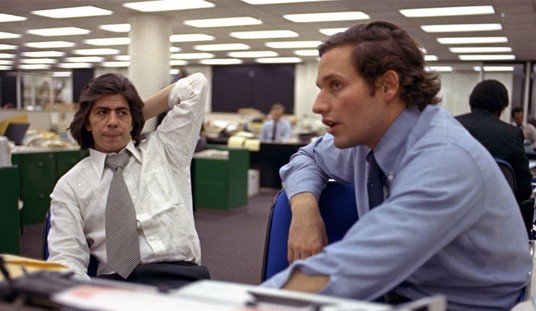I recall a similar threat being made some years ago, at another moment when Joe Biden had an office in the White House. We know how that turned out.
And we know who was watching and drawing lessons from it.
Yesterday a reporter pressed Jen Psaki on whether the White House should try an “alternate strategy” to communicate to Putin that using WMDs in Ukraine would be a gamechanger. Psaki’s reply: “Like what?” I find myself asking the same thing this afternoon. How much more “severe” a price could Russia pay than it’s already paying right now short of NATO entering the fray?
To put that differently, how do we reconcile this statement…
Q: "Would the U.S. have a military response if Putin does launch a chemical weapons attack?"
President Biden: "Russia would pay a severe price if they use chemical weapons." pic.twitter.com/BJy8mxsPDU
— CSPAN (@cspan) March 11, 2022
…with this one?
Biden: "We will not fight a war against Russia in Ukraine. A direct confrontation between NATO and Russia is world war 3 — something we must strive to prevent. But we already know Putin's war against Ukraine will never be a victory." pic.twitter.com/gxxqxkgHHP
— Aaron Rupar (@atrupar) March 11, 2022
A “severe price” would presumably entail further sanctions and embargos. But, uh, what’s left to sanction? We’re already pretty far down the road to total economic war here:
Reuters: WHITE HOUSE SAYS BIDEN EXECUTIVE ORDER WILL BAN FUTURE U.S. INVESTMENTS IN ANY SECTOR OF RUSSIAN ECONOMY
— Kyle Griffin (@kylegriffin1) March 11, 2022
Maybe “severe price” means cyberwarfare plus ramping up shipments of weapons to Ukraine, including certain high-tech materiel we might be holding back at the moment. For instance, those MiGs will certainly be transferred if Ukrainians end up being gassed. And the U.S. might boost its intelligence cooperation with the Ukrainians in the aftermath of a chemical attack. Reportedly we haven’t been giving them enough information about Russian troop positions to allow for “real-time targeting.” That could change.
Still, it seems unwise for the president to essentially dare Putin to use WMD, particularly when Obama’s bluff was successfully called by a Putin client 10 years ago. Why is he addressing the subject at all?
The answer, I think, is that U.S. intelligence is genuinely nervous that some sort of Russian false flag is coming. Marco Rubio, who’s on the Senate Intel Committee, has been warning about it all week. It’s unclear if there’s reason to believe something is up behind the scenes or if the alerts are driven by the fact that Russian media has been in overdrive lately pushing disinformation about Ukrainian WMDs.
❗️ Radical Ukrainian groups under the control of US special services' representatives have prepared several potential scenarios of using of toxic #chemicals to carry out #provocations.
Objective – to accuse Russia of chemical weapons use vs civilians.
👉 https://t.co/qiJGmXyJfa pic.twitter.com/3CPnp1pguo
— MFA Russia 🇷🇺 (@mfa_russia) March 11, 2022
Russian embassy in Spain implies Covid-19 was created by Ukraine in US-funded labs. This is pretty much the exact disinformation scenario US intelligence warned about earlier this week. pic.twitter.com/hsJrD9389Y
— Rosa Furneaux (@rosafurneaux) March 11, 2022
Russian ambassador to UN, Vasily Nebenzya, is actually claiming that Ukraine and the US had a plot to spread biological weapons with migratory birds, bats and insects.
Amazing scenes.— Julian Borger (@julianborger) March 11, 2022
For its part, Ukraine is claiming that Russia has sinister designs on the Chernobyl nuclear plant that’s now fallen under its control:
Ukrainian Main Intelligence Directorate warns about Russia’s plans to organize a nuclear disaster at Russia-occupied Chernobyl nuclear power plant. I can easily imagine it. https://t.co/Vd1ODXbXZx
— Sergej Sumlenny (@sumlenny) March 11, 2022
The accusations about Ukrainian WMD made by Russia and promoted by Putin’s apologists here in the U.S. have reached such a fever pitch that Zelensky himself felt obliged to address them:
Powerful appeal of @ZelenskyyUa in Russian to those who believe in pro-Kremlin propaganda. “I am the president of an adequate country and an adequate people. I am the father of two children. No chemical or any other weapons of mass destruction have been developed on my land.” pic.twitter.com/COe1kTTCEu
— Hanna Liubakova (@HannaLiubakova) March 10, 2022
The Kremlin is obviously laying the rhetorical groundwork for something, either a false-flag chemical or biological attack it can blame on the enemy or a pretext to wage total war against the Ukrainians as their campaign for a quick conquest falters (“we must destroy the Ukrainian WMD program!”), or both. As for how Russia might deliver a chemical payload into Ukrainian populations, this thread is illuminating. The thermobaric rockets that they use in the field can apparently be easily converted to chemical weapons by people who know what they’re doing. And, conveniently, the people operating the thermobaric rocket launchers are qualified.
Putin’s interest in a WMD attack might follow the logic of “escalate to deescalate,” the same strategy that reportedly guides Russia’s use of tactical nuclear weapons. Under E2D, if Russia’s conventional military finds itself losing, it might use a small nuclear weapon to force the enemy to back off and sue for peace for fear that if the conflict continues it will spiral into all-out nuclear war. But the taboo against nuclear weapons is such that even Putin might feel reluctant to use them; the taboo against chemical weapons, which have been used in Syria and cause far less destruction, is far weaker. If Russia concludes that there’s no hope of achieving its objectives in Ukraine, it could resort to chemical weapons to try to maximize its negotiating leverage over the eventual peace deal.
The Kremlin would dutifully blame any chemical attack on the Ukrainians, of course, but all parties involved would know who was responsible and how things might escalate if a deal wasn’t immediately reached. Think of it as an eastern European version of the U.S. using atomic bombs on Japan to end World War II. The enemy has the choice to surrender, sparing both sides from terrible losses, or to fight on and take the consequences of truly nightmarish weapons. It worked for us. Putin may be calculating that a chemical version in Ukraine would work for him.
I’ll leave you with this clip in which a bioweapons expert explains what those mysterious labs in Ukraine are really up to. Jim Geraghty also has a nice analysis at NRO in case you don’t have seven minutes to devote to a video.
Is the US helping Ukraine make bioweapons? Dan blasts the dangerous rhetoric from conservative hosts spreading that conspiracy theory, and gets the real story on the Ukrainian biolabs from someone who's actually been there. @CSRisks @AndyWeberNCB (2/2) pic.twitter.com/jg3lUhg0t1
— Dan Abrams Live (@danabramslive) March 11, 2022








Join the conversation as a VIP Member